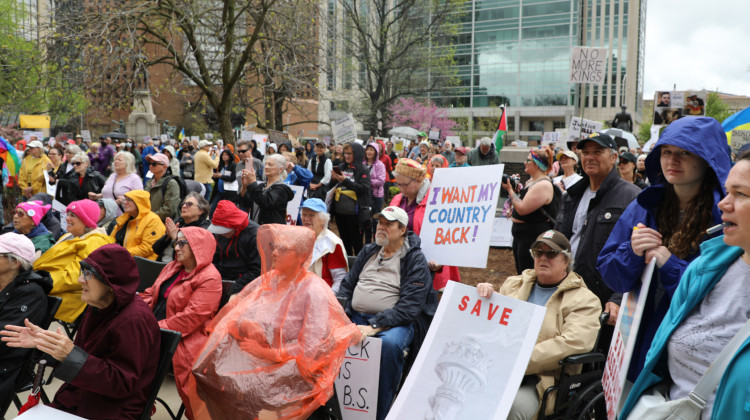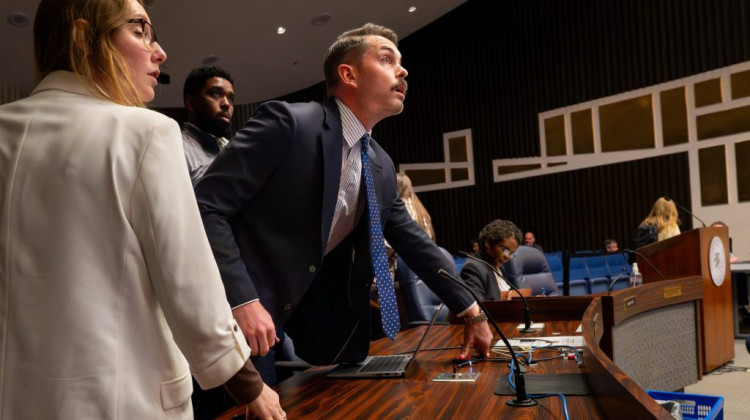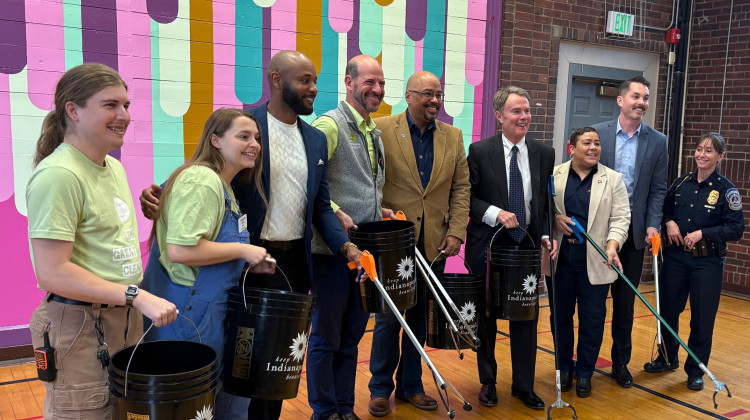Indianapolis has a goal to end youth homelessness by 2023. WFYI City Policy Reporter Jill Sheridan covers efforts to reach that goal, and today we look more closely at work to help a group especially vulnerable to youth homelessness. For this next segment, Sheridan talks with WFYI’s Taylor Bennett about the risk for foster youth.
Taylor Bennett: An estimated 250 young people experience homelessness on any given night in Indianapolis. Jill, you’ve been covering youth homelessness and efforts to decrease it -- why are children in foster care at a greater risk than other demographics?
Jill Sheridan: A number of reasons. As many 18 year olds “age out” they don’t have a job that can pay for all the things -- rent, food, utilities, a car … Some are still trying to finish high school. Something I've been hearing a lot about is they simply do not have the family support to fall back on.
Bennett: We are going to talk about your reporting efforts to house those children in a moment, but first we’re going to hear from someone who lived that experience...
Sheridan: Yes, 22-year old Dejuna Rodriguez. We were able to meet recently, and I have part of that interview to share here - she talks about challenges navigating the system to the next stage in life, and starts off recounting the social and emotional stress of being in the system.
Dejuna Rodriguez: I didn't know how to process all those emotions. I didn't know how, you know from the outside looking in. We foster youth can be difficult a little bit. So you have behavior problems. I didn't know how to sit and talk to people like this. You know, I was shut down. I was very defensive. I was very self isolating.
Sheridan: Rodriguez entered foster care when she was 14 and cycled in and out.
Rodriguez: It is very hard for education stability, you know, my credits getting lost. And so here I was, like 17 years old, fresh into society. I didn't realize I was very institutionalized. I just had to get a hold of myself like you have goals you know, you still that girl with all these goals. I hadn't finished high school. You know, I hadn't knew how to drive. I've never really been a person to like, be in the same predicament that I was a year before I even if it's little or something, always grow.
Sheridan: She told me that after she left state care at 18 - she eventually connected with a cousin who lived in Indianapolis but was moving to Chicago. Her cousin said she could stay in her former apartment -- but no one was paying rent anymore.
Rodriguez: I would get up in the morning like this was after she had moved everything like so quick. So like within like two weeks I'm there. I'm expecting the lights to be cut off and everything will be cut off and she's telling me like she cut off everything and the lights by the grace of God.
You know it was a risk every day I'm leaving this apartment I don't have no keys to lock this door all the little stuff that I got is in there it could be they could come back and like lock the door anytime that they want to you know it was just a risk.
Sheridan: Rodriguez told me she went on, in a number of bad situations until she was 19 and decided there must be some help for foster youth. She started researching and found the group Foster Success, but she didn’t have the money to get there.
Rodriguez: So I went to the plasma center I donated I had what I had to cash Uber. I get here, Mr. Lissa. It was actually me and my friend. We were both homeless. We were both foster youth. And we were both homeless. Yeah, we were both homeless.
Sheridan: That group helped her connect with programs and state financial assistance to get an apartment and find a job. She graduated high school on the honor roll… and she told me she started asking questions.
Rodriguez: How do we stop this cycle of going to generation to generation generation? My mother was in foster care. I never knew that until I got in foster care. Now it makes sense a lot of the things that she did I didn't understand growing up. It makes sense a lot of the things the way that she moved I didn't really understand it. So my things be I think about the kids.
Sheridan: So it’s been two years since that time and now Rodriguez sits on three different youth foster boards and she works at Voices - a non-profit that helps youth involved in the criminal justice system.
Bennett: Are a lot of the people she helps from similar lived experiences?
Sheridan: Many are. She says a lot of the young women she meets, many who she was in the system with, are young mothers -- and I can play a clip here where she shares some perspective on that.
Rodriguez: They're scared. They're scared to get help because when they think of DCS, they think of kids getting taken. They are scared to admit that they need help because they feel like they will lose the only motivation that they have.
Bennett: So they don’t ask for help, because they are scared they will lose their children.
Sheridan: Yes, and I think that shows the mistrust many may have in the system.
Bennett: So how many groups are working to connect them with services?
Sheridan: There are many efforts public and private -- through school, through housing groups -- that work to connect them with different resources meant to give them assistance.
One local non profit - focuses on that transition until 26, Foster Success. President and CEO Maggie Stevens she said the pandemic really highlighted the importance of family support and what the lack of it can mean, here is a quote from her on that perspective.
Maggie Stevens: You know, one of the things that I have been aware of since I entered this work, and it even was kind of amplified over this past year, is the idea of family privilege. And so many individuals and you know, they have their family to fall back on when colleges shut when they lose their job when they just need that additional support.
Bennett: So how can these young people new into society find the resources they need?
Sheridan: Well, Foster Success coordinates some state services for youth. They can help connect with services including help Medicaid or the HIP. Some can get financial assistance until 21 through the state. They can also help with public transportation or financing a car. But there are still barriers including a lack of long term solutions if youth are not connecting with job opportunities or education.
Bennett: So for the city’s plan to end youth homelessness in the next two years, what tactics is it focused most on?
Sheridan: So first they say “end” but that doesn’t mean they think they will solve every housing crisis entirely in the next two years or have every person sheltered.
What it does is it aims to reduce the amount of time someone may go without shelter to less than 30 days. They will focus on housing first meaning housing is first and foremost and permanent housing solutions that are affordable.
Bennett: Does the expected uptick in evictions this summer throw any of that off?
Sheridan: It's hard to say. I've been reporting on a number of city/community partnership that have been helped with additional funding for housing focused programs this year. But the answer is no one knows, especially not after 2020.
Maggie Stevens, the president and CEO of Foster Success, is one of many who expect homelessness to increase as pandemic-related federal support ends. Here’s what she says about that.
Stevens: We've seen it over the past year and unfortunately I anticipate as these rent, moratoriums, utility moratoriums expire, where it's gonna escalate and we're gonna see more and more young people who need a support.
Sheridan: That eviction moratorium ends in June.
Bennett: Thank you Jill, for covering this issue.
Sheridan: Thank you for talking about it with me.
Jill Sheridan is the WFYI city policy reporter, and you can find her reporting on this and other topics at wfyi.org/news. She was interviewed here by WFYI’s Taylor Bennett.
 DONATE
DONATE






 View More Articles
View More Articles



 Support WFYI. We can't do it without you.
Support WFYI. We can't do it without you.